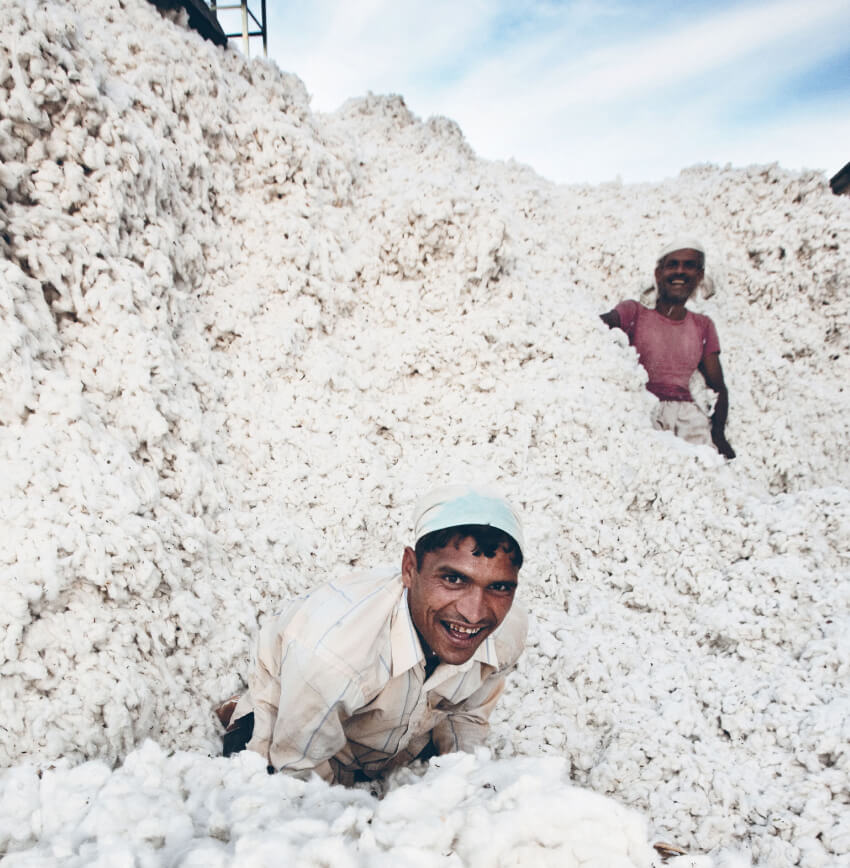Custom Made
Fully bespoke design & manufacture creating a unique identity for your brand.
Off the Shelf
Stock garments, from a wide range of leading brands, ready for embroidery or print.
Sourcing
We are experts in supplying ethically sourced and carefully coordinated full inventory requirements.

We are proud to work and partner with many wonderful businesses globally.
Please read about some of the amazing people we collaborate with and the incredible materials they produce and hear about the many inspiring initiatives and standards we are committed to supporting.
To protect the biodiversity, people and planet, Tiger Cotton® works to convert conventional cotton farming to organic. High quality label free basic wear made by 100% organic in conversion cotton and certified EU Ecolabel, SA8000, GOTS In Conversion and Oeko-Tex.
The first Tiger Cotton® farmers lived and worked side by side with the great Bengal Tiger in Madhya Pradesh, India. Tiger Cotton® is named after them and the tiger is a symbol of all the biodiversity and wildlife that regenerate when a conventional farmer converts into organic.
It started out as a pilot project in collaboration with WWF India and has now grown into a full-scale product-line converting farmers all over India.
When the tigers wander from one nature reserve to the other the cotton fields function as an important tiger corridor. Without the toxic impact of pesticides in cotton farming the tiger, the wildlife, and the farmer can thrive.
By creating a healthy corridor where the tigers can walk between reserves, organic farmers are playing a key role in the conservation of this imposing species.
4.000 FARMERS CONVERTED!
In Madhya Pradesh, Tiger Cotton has now helped 4000 cotton farmers convert into certified organic.
Tiger Cotton is our way to work directly with farmers and help them improve their situation and increase biodiversity.
Fairtrade connects producers, businesses, and consumers in a global system of sustainable, ethical trade.
With over 30,000 unique Fairtrade products on sale worldwide, the decisions you make while shopping can improve the lives of farmers and workers in developing countries.
Fairtrade uses its standards and certification to change trade for the better, in a way that is fair for producers and fair for consumers. Fairtrade isn’t charity. Farmers growing Neutral® cotton receive a fair price for their crops.
With the Fairtrade minimum price and Fairtrade Premium, they can invest in better tools and send their kids to school.
Manufactured by our thread Partner of 30 years, Sensa Green is a soft sustainable embroidery thread made from 100% TENCEL™ Lyocell fibres. The first coloured machine embroidery thread made from naturally strong, smooth, biodegradable lyocell. This new premium thread is feather soft, gentle on the skin and has a distinguished silk matt finish. The manufacturing process uses environmentally friendly technologies and sustainable raw materials, wood is the thread’s main ingredient. Developed in response to the focus on sustainability, Madeira’s latest innovation is an important development and a critical move for both the textile industry and the environment.
No substances of animal origin are used in the production of Madeira’s Sensa Green embroidery threads.
Premium quality machine embroidery thread made of 100% recycled post-consumer PET bottles. Bottles made from PET can be recycled and used to manufacture new bottles, packaging or in this case fibres to produce new POLYNEON Green thread.
Created in response to the global demand to reduce plastic bottles, with POLYNEON Green, our thread suppliers are reducing the amount of plastic in the environment and making the textile industry more sustainable.
No substances of animal origin are used in the production of POLYNEON Green threads.
Organic Cotton is grown using only natural fertilisers and non-genetically modified seeds.
Wastewater is treated so that no contamination is released into the environment.
Finishing leaves no dye, bleach or chemical residue.
Common cotton production uses agricultural chemicals to ward off pests, with one study reporting that 16% of the world’s pesticides are used on cotton.
When considering the difference between organic cotton and cotton, the most worrying statistic suggests that Global cotton production requires over 250 billion tons of water annually.
One of the most notable ecological benefits of organic cotton is that the farming process utilized approximately 71% less water than regular cotton to produce an organic cotton crop.
We work with a large, and continuously growing range of Organic Cotton brands.
Our textile recycling programme provides a secure and environmentally responsible solution for end of use textiles, including uniform, workwear, PPE and laundry.
Natural fabrics such as cotton, wool, and Tencel can be re-used to make new garments in a true circular fashion and other materials can be recycled and used in a wide variety of other products including insulation, partition wall boards, composite furniture, polyester fabrics or Refuse Derived Fuel (RDF).
This programme offers the opportunity to drastically reduce the amount of textiles that go to landfill.
SA8000 is based on the principles of international human rights norms. It measures the performance of companies in eight key areas: child labour, forced labour, health and safety, free association and collective bargaining, discrimination, disciplinary practices, working hours and compensation.
Factory workers are hard-working people. It’s okay when they have good, safe working conditions.
When our partners use SA8000, the highest international labour standard in the world, we know that’s the case.
Fair Wear Foundation is a non-profit organisation. Their mission is to see a world where the garment industry supports workers in realising their rights to safe, dignified, properly paid employment.
The Oeko-Tex Standards 100 comprehensively addresses the human ecology component of textiles products. It screens for any harmful substances present within processed textiles, which are intended to come in contact with consumers.
Oeko-Tex screens your finished product for hazardous chemicals and any other harmful substances.
Oeko-Tex is your final stamp and guarantee to say that this garment is clean and ready to wear. No need to wash.